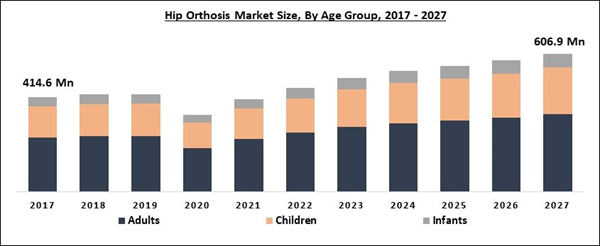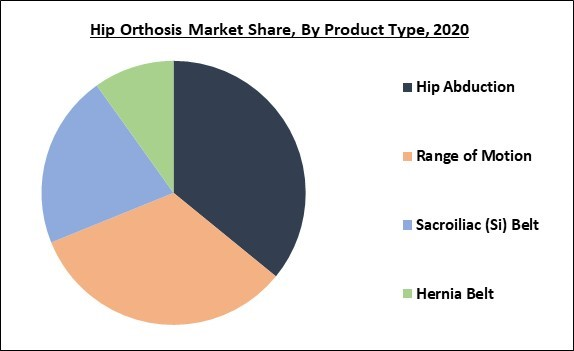The Global Hip Orthosis Market size is expected to reach $606.9 Million by 2027, rising at a market growth of 6.9% CAGR during the forecast period. An orthosis is a kind of brace, splint, or other wearable tools that are used to improve mobility, correct biomechanical misalignments, prevent injuries, minimize the pain caused by weight, and immobilize injured body part to promote healing. A hip orthosis is majorly used after a hip replacement revision surgery or to treat a dislocated hip of a patient. The orthosis is a kind of brace that holds the femur (thigh) in the hip socket. In addition, it is utilized to prevent excessive hip motion in order to heal the injury. Moreover, patients are advised by the doctor to wear a brace for 24 hours for faster recovery.
Hip disorders majorly affect the hip joint, impacting thigh movement and the ability to support the weight of your body. In several instances, hip disorders lead to extreme pain which causes discomfort. The components of hip orthosis include hip joint, hip/pelvic girdle, and thigh cuff. Additionally, the joints are adjustable which enables movement to some degree. This helps in aligning the position of the head of the femur (thigh) in the hip socket that helps the bone, ligaments, and surrounding muscles to become free from ailment. Hip orthosis treatment is used and beneficial for all age groups. For example, infants majorly suffer from dysplasia of the hip in which the hip becomes unstable. To treat such kind of disorder among infants, Pavlik harness or hip abduction orthosis is used that brings hips in the correct position. Similarly, the same treatment, hip abduction orthosis is used among children to treat Legg-Calve-Perthes disease.
COVID-19 Impact Analysis
Due to the outbreak of the COVID-19 pandemic, various industries witnessed severe disruptions across their business activities. World Health Organization (WHO) announced the outbreak of the COVID-19 as a Public Health Emergency. Due to this, the lockdown was imposed across the world, public & private transports were stopped which resulted in a reduction in road accidents and associated injuries. Additionally, the scheduled treatments were kept on hold to majorly focus on the rapidly increasing COVID-19 patients across the world. All other treatments were put on halt, which also declined the demand for the hip orthosis treatment. As a result, the hip orthosis market witnessed a negative impact of the COVID-19 pandemic.
Market Growth Factors:
The growing geriatric population is increasing the demand for hip orthosis
Among the world's total population, the geriatric population has acquired the highest percentage. This increase in the older population is expected to fuel the healthcare industry, especially in well-established nations. The aged population is more susceptible to hip disorders as the chances of degenerative diseases occurrence and hip fracture increases in older age. Moreover, with the rise in the geriatric population, hip orthosis is also witnessing a significant surge in its demand. The cases of hip disorders, hip fractures, and degenerative diseases are increasing across the world, especially in developed and developing nations.
Hip orthosis displays a high success rate
The adoption of hip orthosis has led to improve health. Patients have found its adoption very beneficial as it helps in speedy recovery. A hip orthosis is a kind of brace used to correct the dislocated hip or after a hip replacement surgery to prevent excessive motion in the hip that significantly leads to healing the injured part. Moreover, it is a safe, effective, and durable way to treat several problems that come along with the severe arthritis of the hip.
Market Restraining Factor:
High cost due to lack of resources
The hip orthosis treatment is comparatively expensive than other treatments. In addition, the device used after the treatment to prevent joints from getting displaced is also costly, which leads to an increase in the overall cost of the treatment. Various benefits are associated with the adoption of hip orthosis devices but several patients are not enough financially strong to afford such a high cost of the treatment and hip orthosis. Moreover, there is a dearth of human resources that are utilized in the manufacturing of hip orthosis products.
Age Group Outlook
Based on Age Group, the market is segmented into Adults, Children, and Infants. The millennial population suffering from degenerative diseases is constantly increasing, which is anticipated to create new growth avenues for the hip orthosis market in the forthcoming years. Additionally, the success rate of minimally invasive surgeries has escalated due to a significant surge in robot-assisted surgeries, thereby creating lucrative growth opportunities for the market in the coming years.
Product Type Outlook
Based on Product Type, the market is segmented into Hip Abduction, Range of Motion, Sacroiliac (Si) Belt, and Hernia Belt. The hip abductors are necessary muscles that help the human body to sit, stand and walk properly along with enabling rotation of legs with ease. Moreover, hip abduction exercises help in preventing & treating pain in the hips & knees and also make hips tight and toned. Hip abduction exercises are beneficial for all age groups, particularly for athletes.
Mobility Outlook
Based on Mobility, the market is segmented into Wearable and Fixed. In 2020, the wearable hip orthosis segment acquired the substantial revenue share of the hip orthosis market.
Application Outlook
Based on Application, the market is segmented into Osteoarthritis, Congenital Dysplasia of the Hip, Coxa Valgum, Hip Fracture, Hip Dislocation, and Others. In 2020, the osteoarthritis segment obtained a substantial market size and is expected to maintain similar kind of trend even during the forecasting period. Osteoarthritis is a degenerative joint disease and a type of arthritis that has affected millions of people across the world.
Regional Outlook
Based on Regions, the market is segmented into North America, Europe, Asia Pacific, and Latin America, Middle East & Africa. In 2020, North America emerged as the dominating region in the hip orthosis market. The factors such as well-established healthcare infrastructure, increase in focus on healthcare, and the presence of key players with a strong distribution network are accountable to drive the growth of the regional hip orthosis market. Moreover, the demand for hip orthosis witnessed a significant surge, owing to the growing number of hip disorders in North America.
The market research report covers the analysis of key stake holders of the market. Key companies profiled in the report include Restorative Care of America, Inc. (RCAI), DJO Global (Colfax Corporation), Bauerfiend AG, Steeper Group, Innovation Rehab Ltd., Hanger, Inc. (Hanger Clinic), Becker Orthopedic, Ottobock SE & Co. KGaA, and Össur.
Recent Strategies Deployed in Hip Orthosis Market
- Oct-2021: Ottobock expanded its geographical reach in the Bulgarian city of Blagoevgrad by opening a manufacturing plant for high-tech prosthetics and bionic implants. Through the opening of the plant, the company is expected to produce wheelchairs fabrication in Bulgaria.
- Aug-2021: DJO unveiled EMPOWR Dual Mobility, the latest addition to the EMPOWR Hip portfolio. This latest addition offers surgeons a solution to treat a big group of patients that require the best joint stability.
- Jun-2021: DJO signed an agreement to acquire Mathys AG Bettlach, a Switzerland-based company. Through the acquisition, the company is expected to expand its fast-growing reconstructive business outside of the U.S., reinforcing innovation pipelines and expanding product offerings.
- Apr-2021: DJO took over MedShape, a privately held orthopedic medical device company. Under this acquisition, the company is expected to include MedShap's portfolio that comprises advanced devices for fracture fixation, joint fusion, and soft tissue injury repair, which is expected to use biomaterial technologies that are developed to enhance patient outcomes.
- Apr-2021: SPS, a subsidiary of Hanger formed a partnership with UNYQ, a leader in the field of 3D-printed prosthetic covers. Together, the companies is expected to provide UNYQ’s collection of products, and UNYQ Wears to clinics in the SPS network across the US.
- Dec-2020: Accelerated Care Plus entered into a partnership with Current Health, a global leader in remote healthcare delivery. Through this partnership, Accelerated Care Plus is expected to offer post-acute care facilities, the ability to monitor, engage, and manage with their patients.
- Jul-2020: Ottobock came into partnership with Hilti, a construction technology. Together, the companies aimed to expand their portfolio of ergonomic solutions.
- Nov-2019: Ottobock took over Vigo, a leading O&P specialist. This acquisition is expected to offer benefits to patients across Belgium and Poland.
- Oct-2019: Hanger took over Boas Surgical, a prosthetic services provider. The acquisition aimed to offer effective and efficient clinical care and remarkable customer service.
- Feb-2019: Hanger completed the acquisition of HP Multi Jet Fusion 3D printing technology, a powder-based technology. The acquisition aimed to determine the best utilization of the 3D printing manufacturing technology in existing processes and explore new, disruptive designs & solutions for the O&P industry.
- Feb-2019: Össur announced the acquisition of College Park Industries, a global provider of lower and upper limb prostheses and supporting services. The acquisition is expected to improve companies' portfolios in both lower & upper limb prosthetics. Moreover, Össur is expected to support College Park’s focus on the lower active population and reinforce its acknowledged presence in the upper limb arena.
- Nov-2018: DJO came into partnership with SirenMD, a secure collaboration, and documentation platform. Through this partnership, DJO is expected to provide existing sales channels and customers with the latest and advanced coordinated care platform.
- Mar-2018: Ottobock completed the acquisition of BionX, a Canadian maker of electric motors for bicycles as well as bicycle retrofit kits. The acquisition aimed to reinforce Ottobock position as the global market leader in prosthetics.
Scope of the Study
Market Segments Covered in the Report:
By Age Group
- Adults
- Children
- Infants
By Product Type
- Hip Abduction
- Range of Motion
- Sacroiliac (Si) Belt
- Hernia Belt
By Mobility
- Wearable
- Fixed
By Application
- Osteoarthritis
- Congenital Dysplasia of the Hip
- Coxa Valgum
- Hip Fracture
- Hip Dislocation
- Others
By Geography
- North America
- US
- Canada
- Mexico
- Rest of North America
- Europe
- Germany
- UK
- France
- Russia
- Spain
- Italy
- Rest of Europe
- Asia Pacific
- China
- Japan
- India
- South Korea
- Singapore
- Malaysia
- Rest of Asia Pacific
- LAMEA
- Brazil
- Argentina
- UAE
- Saudi Arabia
- South Africa
- Nigeria
- Rest of LAMEA
Key Market Players
List of Companies Profiled in the Report:
- Restorative Care of America, Inc. (RCAI)
- DJO Global (Colfax Corporation)
- Bauerfiend AG
- Steeper Group
- Innovation Rehab Ltd.
- Hanger, Inc. (Hanger Clinic)
- Becker Orthopedic
- Ottobock SE & Co. KGaA
- Össur
Unique Offerings from the Publisher
- Exhaustive coverage
- The highest number of market tables and figures
- Subscription-based model available
- Guaranteed best price
- Assured post sales research support with 10% customization free
Table of Contents
Companies Mentioned
- Restorative Care of America, Inc. (RCAI)
- DJO Global (Colfax Corporation)
- Bauerfiend AG
- Steeper Group
- Innovation Rehab Ltd.
- Hanger, Inc. (Hanger Clinic)
- Becker Orthopedic
- Ottobock SE & Co. KGaA
- Össur
Methodology

LOADING...










